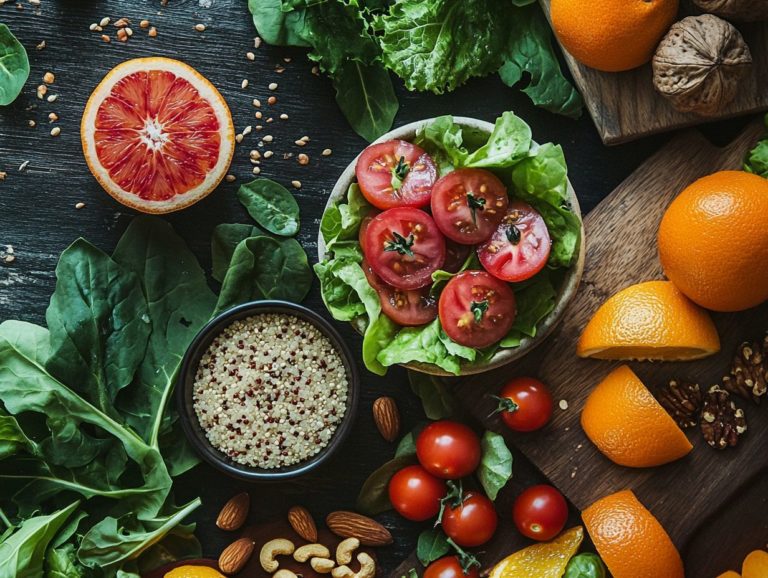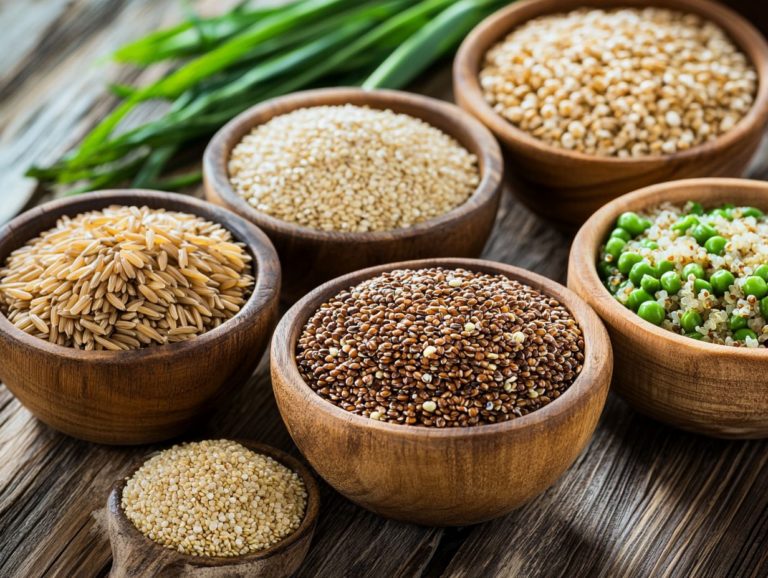10 Foods to Avoid for Better Health
In a world brimming with tempting treats and convenient meals, it s easy to overlook the impact that certain foods have on your health. Let s explore the ten foods you should avoid to boost your health!
By understanding the health risks linked to these items and their effects on your body, you ll empower yourself to make informed choices. You ll also uncover healthier alternatives and practical tips to liberate yourself from unhealthy eating habits.
Are you ready to make a change? Let s discover what s lurking in your pantry!
Contents
- Key Takeaways:
- 1. Processed Foods
- 2. Sugary Drinks
- 3. Fast Food
- 4. Artificial Sweeteners
- 5. White Bread and Pasta
- 6. Fried Foods
- 7. High-Sodium Foods
- 8. Trans Fats
- 9. Canned Foods
- 10. Alcohol
- Why Should These Foods Be Avoided?
- Preguntas Frecuentes
- Cu les son los 10 alimentos principales que se deben evitar para una mejor salud?
- C mo afectan negativamente estos alimentos nuestra salud?
- Por qu deber amos evitar los alimentos procesados y envasados?
- Son todos los carbohidratos malos para nuestra salud?
- C mo podemos hacer elecciones m s saludables en nuestra dieta?
- Podemos seguir disfrutando de algunos de estos alimentos con moderaci n?
Key Takeaways:
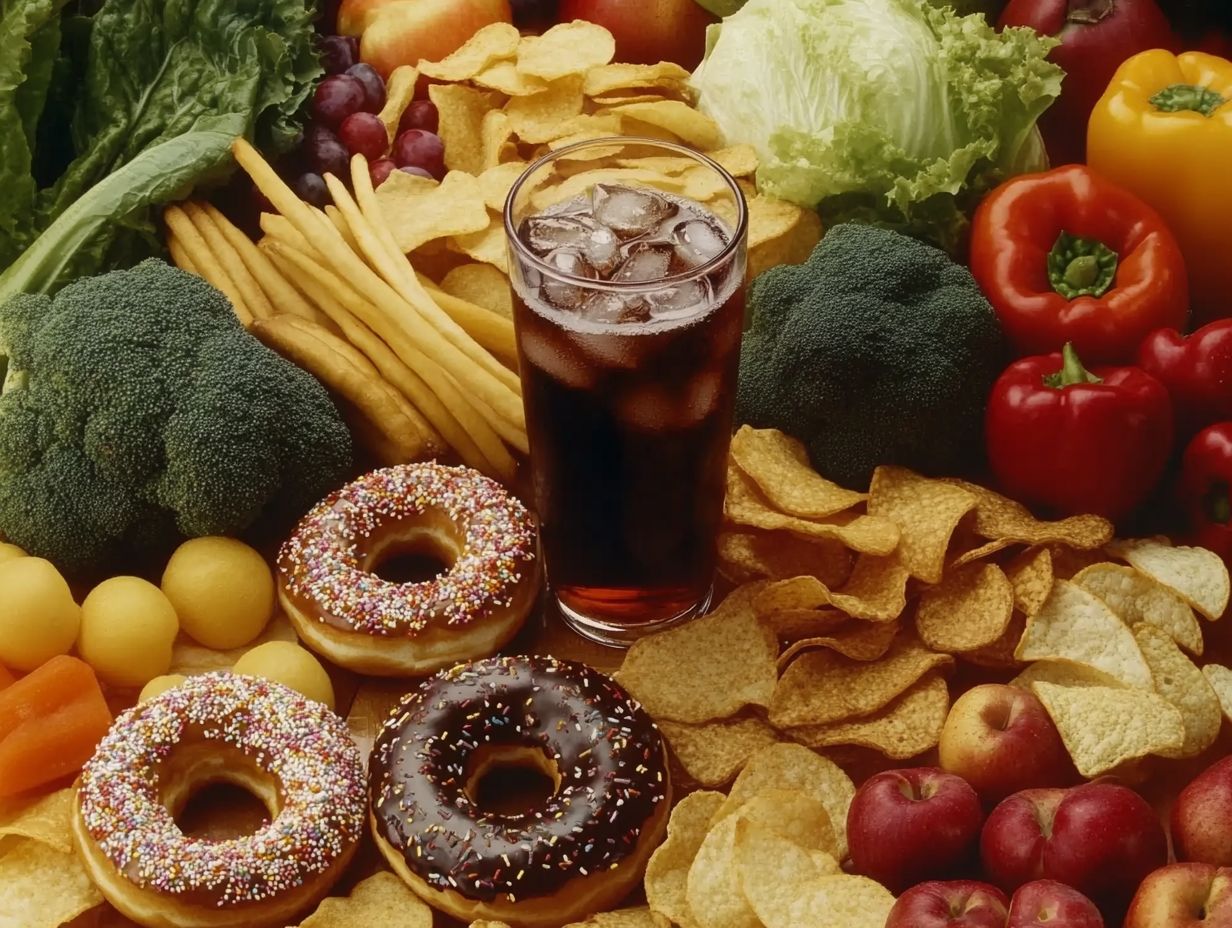
- Avoid processed foods that are high in preservatives, additives, and unhealthy fats for better overall health.
- Limit intake of sugary drinks to reduce the risk of obesity and chronic diseases like diabetes.
- Fast food may be convenient, but it can lead to weight gain and increase the risk of heart disease and other health issues.
1. Processed Foods
Many diets today include processed foods. These foods often contain unhealthy ingredients like hydrogenated oils and excessive sodium.
These components can pose serious health risks and undermine dietary recommendations from experts like Marjorie Cohn and the Environmental Working Group.
Understanding the risks associated with these foods is vital for maintaining optimal nutrition and overall health.
Processed foods generally fall into categories such as snacks, frozen dinners, and canned products, each typically laced with preservatives, fillers, and colorings that can worsen health issues.
Research from the Environmental Working Group reveals that a significant percentage of processed items lining supermarket shelves may harbor substances linked to obesity, heart disease, and diabetes.
An alarming study highlighted by Cohn indicates that indulging in high levels of processed foods can raise your risk of metabolic syndrome a group of conditions that increase your risk of heart disease by nearly 40%.
Therefore, it’s crucial to familiarize yourself with ingredient labels and make informed choices while shopping. This way, you can minimize reliance on these convenient products that could derail your health goals.
2. Sugary Drinks
Sugary drinks, including diet soda, rank among the top sources of added sugars in your diet and are linked to various health concerns, including obesity, diabetes, and heart disease, as highlighted by the American Heart Association.
These beverages ranging from sweetened teas and fruit punches to energy drinks often boast sugar levels that can swiftly surpass recommended daily limits.
Research indicates that many people consume more than the American Heart Association’s guideline of no more than six teaspoons of added sugar daily for women and nine for men.
This excessive intake can pave the way for serious long-term health issues, including an increased risk of metabolic syndrome and cardiovascular problems.
To sidestep these risks, consider opting for healthier alternatives like infused water, herbal teas, or naturally flavored seltzers. You can even try adding slices of fruit to your water for a refreshing taste!
3. Fast Food
Fast food has earned a reputation for being unhealthy, often loaded with refined carbohydrates, sodium, and trans fats. This can take a toll on your dietary habits and overall nutrition.
The convenience and affordability of these quick-service meals have led to an alarming trend where they increasingly replace home-cooked meals in your daily diet.
Many find themselves caught in a cycle of fast food consumption, often unaware of the long-term health consequences that can arise from excessive intake, including obesity, heart disease, and diabetes.
To counteract these challenges, it s essential to educate yourself on making better choices when dining out or cooking at home.
Simple strategies like choosing grilled over fried options, adding more vegetables, or prepping meals in advance can lead to significant improvements in your nutritional intake and overall well-being.
4. Artificial Sweeteners
Artificial sweeteners, often touted as healthier alternatives to sugar, come with their own health risks. Experts, like dietitian Julie Andrews, urge you to consider the potential effects on brain health and weight management.
These low-calorie substitutes, from aspartame to stevia, find their way into many foods and beverages to help you cut calories without sacrificing that sweet taste you love.
However, their use can create confusion when it comes to understanding long-term implications. Research indicates that while some artificial sweeteners may aid in weight loss or blood sugar regulation, others could disrupt gut bacteria or even trigger cravings, complicating your dietary goals.
As nutrition experts stress, you need to weigh these benefits against possible side effects. This fosters a more informed and balanced approach to your sweetener choices.
5. White Bread and Pasta
White bread and pasta, often made from refined carbohydrates, tend to be less nutritious than whole-food options. Nutritionists, like Amy Gorin, recommend steering clear of these choices for better health outcomes.
Instead, consider opting for whole grain alternatives. These significantly boost your intake of essential nutrients like fiber, vitamins, and minerals.
Whole grains such as brown rice, quinoa, and whole wheat products retain all parts of the grain, supporting digestive health and contributing to sustained energy levels.
The high glycemic index of refined products can lead to weight gain and elevate the risk of chronic diseases. Don’t wait explore healthier options now!
By incorporating more fruits, vegetables, legumes, and nuts into your meals, you can enhance your diet with wholesome fiber and essential nutrients, promoting your overall well-being.
6. Fried Foods
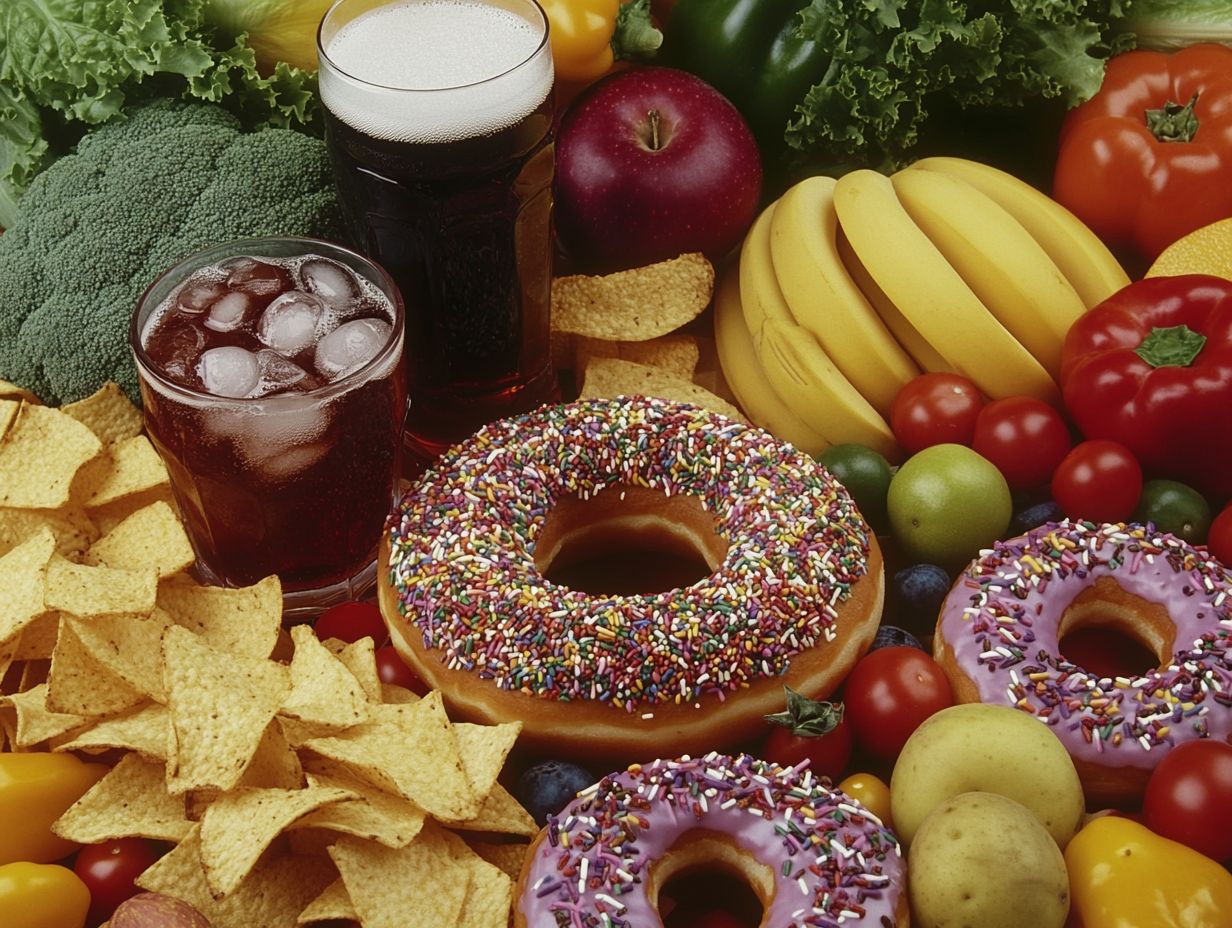
Fried foods often come with trans fats and excessive calories, raising several health concerns, including heart disease. Experts, such as Lorraine Kearney, emphasize these risks in their nutrition recommendations.
Those tempting dishes like crispy fries and golden-brown chicken can pose serious threats to your overall well-being when indulged in excessively. Common preparation methods, which involve submerging food in hot oil, significantly ramp up the fat and calorie count.
Consuming these foods too frequently can lead to weight gain and higher cholesterol levels. However, there are healthier cooking alternatives that deserve your attention:
- Baking
- Grilling
- Air frying
These methods allow you to enjoy your favorite flavors while cutting down on unhealthy fats. Remember, moderation is key; balancing indulgence with nutritious choices is essential for a healthier lifestyle.
7. High-Sodium Foods
High-sodium foods, particularly processed meats laden with sodium nitrites, pose significant health risks, including hypertension and cardiovascular disease. This is highlighted by the Prevention Medical Review Board.
You might be surprised to learn that many snacks, canned soups, and fast foods can lead to excessive sodium intake, often without your awareness.
Many popular convenience items cleverly conceal high sodium levels in their flavor-enhancing ingredients. It s essential for you to become more mindful of your choices.
To reduce these risks, consider opting for:
- Fresh fruits and vegetables
- Whole grains
- Lean proteins
Additionally, meticulously read labels to uncover lower-sodium options. By honing your culinary skills and incorporating herbs and spices, you can elevate flavor without excessive salt. This fosters better dietary habits that support your long-term health.
8. Trans Fats
Trans fats often lurk in processed oils and present serious health risks, including elevated cholesterol levels and heart disease. Nutritionists like Isadora Baum recommend completely avoiding these fats in your dietary choices.
These harmful fats typically hide in processed foods such as baked goods, fried snacks, and margarine, making it a challenge to maintain a heart-healthy diet. You may not even realize that trans fats can be disguised under names like partially processed oil, leading to unintentional consumption.
To steer clear of these unhealthy fats, scrutinize food labels carefully. Look for products that proudly proclaim “0 grams trans fat” and check the ingredient list for any mention of processed oils. This way, you can make informed choices that prioritize your health.
9. Canned Foods
Canned foods offer convenience but often come packed with additives and preservatives that could compromise your health. Nutritionists like Julia Zumpano suggest taking a moment to check food labels before making any decisions.
This convenience can come at a cost; many canned options are loaded with excessive sodium, sugars, or unhealthy fats, contributing to long-term health issues. Weigh the ease of popping open a can against the potential drawbacks of these processed foods.
When considering canned goods, look for those labeled as low sodium or no added sugars to help reduce health risks. Explore fresh or frozen produce for nutrient-rich options while avoiding excess preservatives often found in canned products.
With smart shopping habits and mindful eating, you can pave the way to a healthier lifestyle.
10. Alcohol
Alcohol consumption, while socially acceptable, carries a range of health risks that can undermine your dietary habits if not approached with moderation. It’s essential to consider these factors, especially if you’re striving for a healthier lifestyle.
The consequences extend beyond immediate effects; over time, excessive drinking can lead to weight gain and nutrient deficiencies. Alcoholic beverages provide empty calories that offer little nutritional value, making it easy to overlook your calorie intake while socializing or unwinding after a hectic day.
To maintain balance, consider mindful drinking strategies:
- Alternate alcoholic drinks with water.
- Opt for lower-calorie options.
- Set limits on consumption during outings.
Embrace moderation as your guiding principle to enjoy social occasions without sacrificing your health and well-being.
Why Should These Foods Be Avoided?
Avoiding certain foods is vital for optimal health, as they can present significant risks, disrupt your dietary habits, and contradict well-established nutritional guidelines promoting a balanced approach to nutrition.
For instance, highly processed foods often pack in excessive amounts of sugar, sodium, and unhealthy fats, leading to obesity and heart disease.
A study published by the American Heart Association highlights that diets rich in these ingredients can elevate the risk of cardiovascular conditions by as much as 30%. Nutritionists strongly advise minimizing your intake of sugary beverages and packaged snacks, especially since about 40% of the American adult population is classified as obese, with diet-related ailments on the rise.
Take charge of your health by understanding these connections! Make immediate changes to your diet to prioritize your long-term health.
What Are the Health Risks Associated with These Foods?
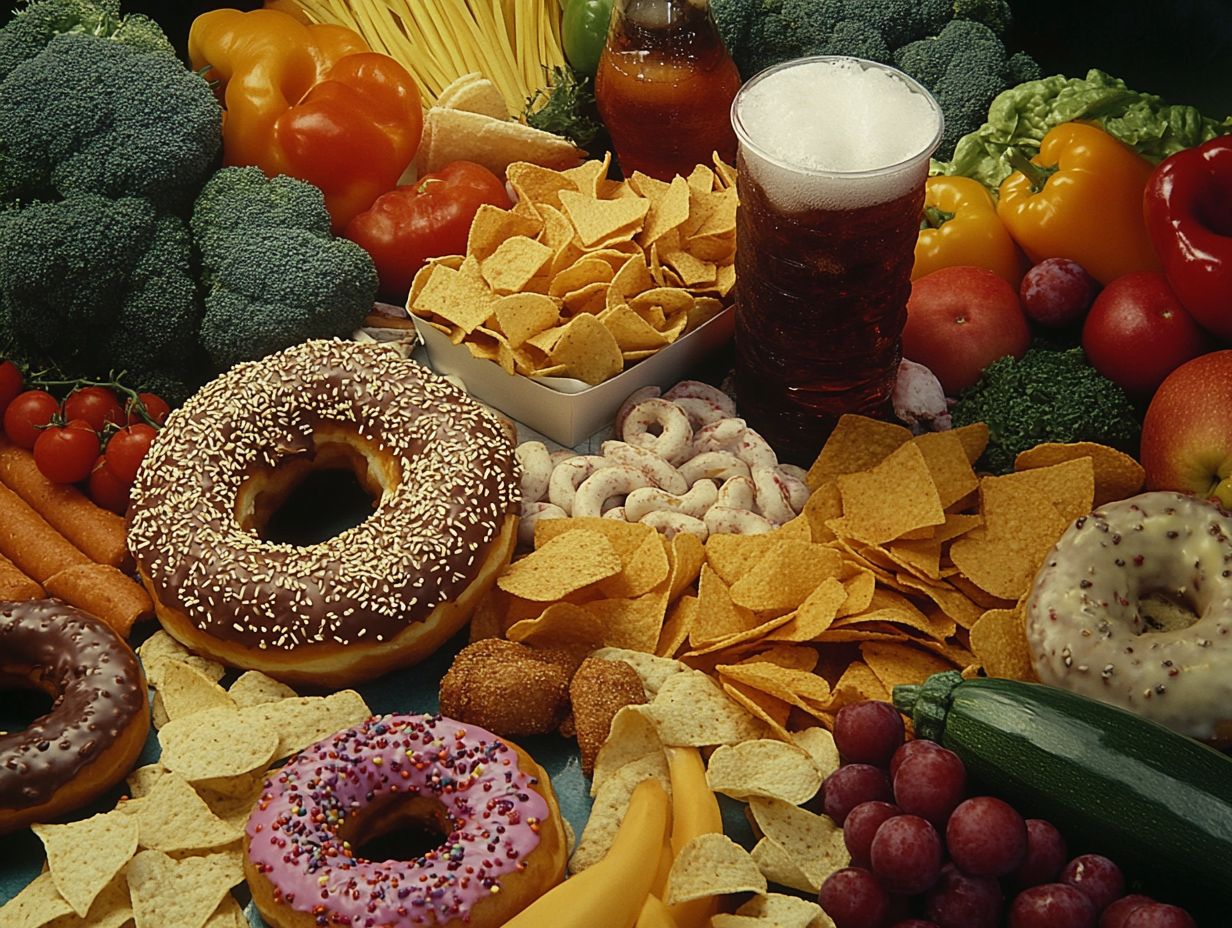
Processed foods, high sodium, added sugars, and trans fats pose significant health risks. These factors contribute to chronic conditions like obesity, diabetes, and heart disease.
Research shows that regularly eating these foods can lead to harmful changes in your body. This can increase inflammation and insulin resistance.
Nutrition experts emphasize that these ingredients disrupt normal bodily functions and are linked to serious health issues.
For instance, a case study published in a leading nutrition journal revealed a strong link between high trans fat intake and rising rates of cardiovascular disease. Another expert noted that people who consume a lot of added sugars often experience energy crashes, mood swings, and unwanted weight gain.
These findings show why it’s crucial to examine your food choices!
How Do These Foods Affect the Body?
These foods can profoundly impact your health by changing your dietary habits and nutrient intake. This may lead to issues like increased inflammation, weight gain, and various metabolic disorders.
When you indulge in processed foods filled with sugars and unhealthy fats, your metabolism struggles to function optimally. This hampers your body s ability to absorb essential vitamins and minerals, disrupting vital processes.
Over time, such dietary choices can pave the way for chronic conditions, including type 2 diabetes and heart problems. The negative effects on gut health can further impede nutrient absorption, leaving your body starved of critical energy sources.
Understanding how your food choices influence your overall health is essential for promoting better long-term wellness.
What Are Some Healthier Alternatives to These Foods?
Discover healthier options to processed foods! Incorporating whole foods, fresh veggies, and natural sweeteners can improve your nutrition.
For instance, when sugary cereals appeal to you, reach for oatmeal instead, topped with fresh fruit and a sprinkle of cinnamon. It’s a fiber-rich breakfast that leaves you feeling satisfied.
If you crave a crunchy snack, air-popped popcorn is a far superior choice to chips, providing whole grains without excess salt and fat.
When baking, consider using banana or applesauce as a sugar substitute. This simple swap sweetens your treats and adds valuable nutrients. Choosing olive oil instead of butter enhances flavor and provides healthy fats that support heart health.
These alternatives will boost your nutritional value and promote a more balanced lifestyle, making your wellness journey enjoyable and rewarding.
How Can a Person Break the Habit of Consuming These Foods?
Breaking the habit of consuming unhealthy foods requires a multifaceted approach. This includes education, meal planning, and nutrition coaching to cultivate healthier dietary habits and strengthen your commitment to healthy eating.
Begin by identifying specific triggers that lead to unhealthy choices, such as stress or social situations. Developing strategies to cope with those triggers is essential.
Keeping a food journal can provide valuable insights into your eating patterns and highlight areas for improvement. Gradually incorporating more fruits, vegetables, and whole grains into your meals can replace unhealthy snacks without leaving you feeling deprived.
Seeking support from a nutrition coach can be key in setting realistic goals, receiving tailored advice, and maintaining accountability. This approach promotes sustainable changes that ultimately enhance your health and well-being.
Start making healthier choices today!
What Are Some Tips for Maintaining a Healthy Diet?
Maintaining a healthy diet requires you to adopt consistent practices. Start by incorporating more whole foods, carefully reading food labels, and following healthy eating guidelines that suit your individual needs.
Effective meal planning is essential for your success. It not only saves you time and minimizes food waste but also gives you the power to make healthier choices throughout the week.
Consider compiling a list of your favorite nutritious meals and prepping ingredients in advance to simplify your cooking process.
Don t shy away from experimenting with ingredient swaps. For instance, replacing rice with quinoa or sour cream with Greek yogurt can elevate your meals with essential nutrients.
Mindful eating means paying attention to your hunger cues and chewing slowly. This practice can improve digestion and help you enjoy your meals more, allowing for satisfaction with smaller portions.
Consulting with nutrition professionals can provide you with tailored guidance, ensuring that your dietary choices effectively meet your personal health goals.
Preguntas Frecuentes
Cu les son los 10 alimentos principales que se deben evitar para una mejor salud?

Los 10 alimentos principales que se deben evitar para una mejor salud incluyen:
- Alimentos procesados y envasados
- Bebidas azucaradas
- Alimentos fritos
- Carbohidratos refinados
- Alimentos altos en sodio
- Carnes procesadas
- Edulcorantes artificiales
- Alcohol
- Grasas trans
- Cantidades excesivas de carne roja
C mo afectan negativamente estos alimentos nuestra salud?
Estos alimentos pueden llevar a aumento de peso, colesterol alto, enfermedades del coraz n, diabetes y otras condiciones cr nicas de salud. A menudo son altos en calor as, grasas no saludables y az cares a adidos, y carecen de nutrientes importantes que nuestros cuerpos necesitan para funcionar adecuadamente.
Por qu deber amos evitar los alimentos procesados y envasados?
Los alimentos procesados y envasados a menudo son altos en sodio, grasas no saludables y az cares a adidos. Tambi n contienen conservantes y aditivos que pueden ser perjudiciales para nuestra salud. Estos alimentos carecen de los nutrientes esenciales que nuestros cuerpos necesitan y est n relacionados con un mayor riesgo de enfermedades cr nicas.
Son todos los carbohidratos malos para nuestra salud?
No, no todos los carbohidratos son malos para nuestra salud. Sin embargo, los carbohidratos refinados, como el pan blanco, la pasta y los pasteles, a menudo son despojados de sus nutrientes y pueden causar un aumento en los niveles de az car en sangre. Es importante elegir opciones de granos enteros, que son m s altos en fibra y nutrientes.
C mo podemos hacer elecciones m s saludables en nuestra dieta?
Algunos consejos para hacer elecciones m s saludables incluyen:
- Leer las etiquetas de nutrici n
- Elegir alimentos enteros y no procesados
- Incorporar una variedad de frutas y verduras en tu dieta
- Limitar tu ingesta de alimentos altos en grasas no saludables, az cares a adidos y sodio
Podemos seguir disfrutando de algunos de estos alimentos con moderaci n?
S , est bien disfrutar de estos alimentos con moderaci n. La clave es no hacer de ellos una parte regular de nuestra dieta y equilibrarlos con alimentos densos en nutrientes. La moderaci n es esencial para mantener una dieta y un estilo de vida saludables.





